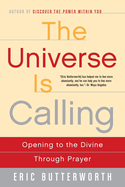THE UNIVERSE IS CALLING [TUIC] can be described as Eric Butterworth's treatise on prayer. It was first published in 1993, just 10 years before his death. Had his views changed since his earlier publications? He still speaks from a place of authority of having the inside track to the religion "of" Jesus as opposed to the religion "about" Jesus. It almost seems comical that Butterworth posits his interpretation as what Jesus really meant, rather than another new thought interpretation. It is also interesting that he wrote a book on a subject as fundamental as prayer so late in his career. Was it not an issue earlier in his career? Or had he taken that long to arrive at his own place of clarity?
There are some recurring themes in TUIC about prayer. One such theme is the idea that we do not pray to God, or for God, but from a consciousness of God [p.23, 152, 162]]. We use prayer to recenter ourselves into the flow of the creative process that is God. Another is that prayer is a scientific proposition: if done correctly it will produce results. Subsequently there is no such thing as a miracle, but applications of Divine Law. Butterworth presented this idea in an earlier publication Discover The Power Within You. He makes a perceptive analogy: "Scientists do not 'discover' laws of nature, they invent them to describe the facts they find [p.27]." Since God is the ever-present "wholeness of life" there is no need to think of any other outcome than our wholeness. Given that proposition, is it a fair assumption to make that he would say many of us are not praying correctly?
Butterworth seems to contradict his own firm stance on the scientific cause-and-effect simplicity of prayer when he speaks of Grace. He writes: "God's desire to express through you and as you is so great that you never completely reap the harvest of error, and you always reap more good than you sow [p.42]." Does this not hint of some external other-than-us influence? Perhaps, but he explains this by saying it is our consciousness that raises the outcomes of our thoughts to a higher level. In Butterworth's view, our life is the result of our consciousness; our body, our weight, our health, our relationships [p.37]. This is a core Unity thought, and perhaps a difficult one to accept. Is it an answer to the age-old question of theodicy...why do bad things happen to good people? In other words, we may think people to be good, and perhaps they are in action, but their consciousness trumps it all? If so, would there really be a place for Grace as he defined it? He revisits this issue of our consciousness when he addresses praying for others [ch.10]. Again, it is a matter of having our consciousness in the right place, which is not on the problem but on letting go and letting God.
Although stressing prayer is more a product of consciousness, Butterworth provides steps to aid in developing "right" consciousness [p.95]. The three-step formula is as follows:
1. Relax and let go of the problem.
2. Get grounded in silent communion.
3. Project the energy built up in the silent time through affirmative words.
He also gives specific approaches for different situations such as prosperity [p.157], decision-making [p.158], and business [159]. He stresses that making a ritual out of the process defeats the purpose, we should let our consciousness be our guide [p.162].
And what do we do after prayer? Prayer, after all, is not about eliciting a response from God but changing our consciousness as it relates to the situation at hand. So should we pray for specific outcomes? And what do we do as we wait? Butterworth invites to know that waiting is not a matter of time but again a matter of consciousness; staying "plugged in, tuned in, and turned on" to our true spiritual nature [p.167]. A reader could infer that he supports the idea of praying for specific outcomes because he does not outright say we shouldn't. He reminds us instead that our challenge is to see things right not try to set them right [p.168] and to trust the process [p.173]. Finally, we give. We give knowing that as we put into the flow we receive from it in return [p.173].


Thanks. This was helpful as I've spent a few days worrying that I can't afford some things that are very important to me that "OPs (other people)
ReplyDeletewould say shouldn't be, like, for instance, This... :)